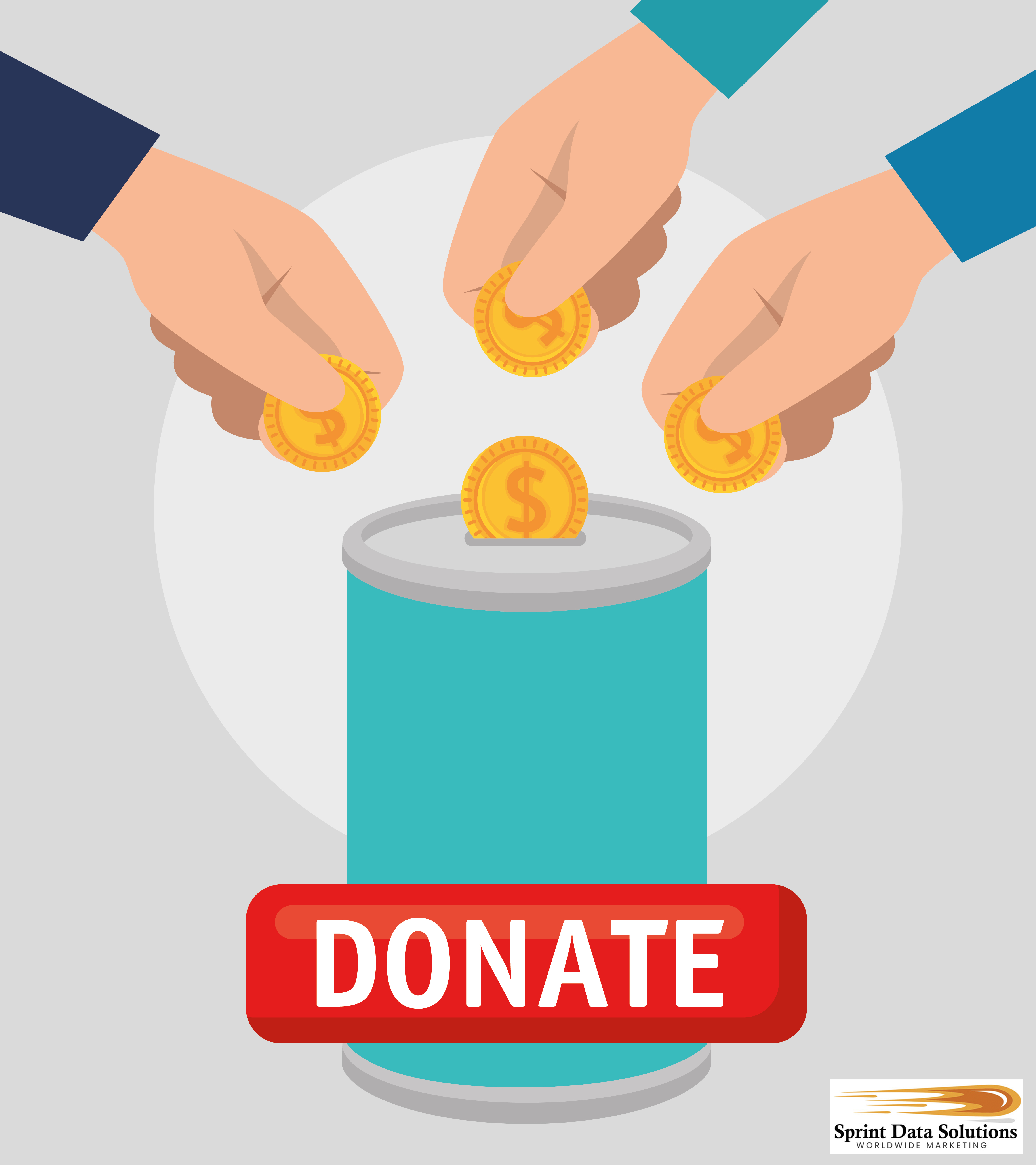The Best Way To Get The Most Donations Is To Find The Right Donors
One of the fundamental truths of the world is that not every organized initiative is designed for profitability. In many cases, the primary goal is not financial gain but to make a positive impact on society. Charitable organizations fall squarely into this category, as they often dedicate significant resources—whether money, time, or manpower—to causes that aim to improve lives and address pressing societal issues. These efforts include providing care for abandoned animals, supporting children in underserved communities, and promoting access to education that helps them build a brighter future.
While these initiatives are incredibly noble and meaningful, they also face a significant challenge: funding. Unlike traditional businesses that generate profits from their operations, charitable organizations rely on external sources of income to carry out their work. The reality is that these organizations often operate under tight financial constraints, and the ability to secure funding is critical to their continued success. This is where donations play a crucial role, providing the necessary resources to fund their programs and sustain their missions. Without the generosity of donors, these worthy causes would struggle to fulfill their objectives and make the impact they strive for.

A Spectrum Of Worthy Causes
Charities play a vital role in American society, offering a wide range of causes that resonate with people from all walks of life. Whether it’s education, healthcare, environmental preservation, or social justice, there’s a cause for everyone to support. Even modest donations, when accumulated from a large number of individuals, can result in significant positive change. The power of collective giving cannot be overstated—it’s the driving force behind many charitable initiatives. In addition to grassroots contributions, businesses and high-net-worth individuals also make substantial donations, recognizing the importance of giving back to communities and supporting causes that align with their values. These donations, both large and small, help drive progress and provide crucial funding for the important work that charities do across the nation. As the culture of philanthropy continues to grow, so too does the opportunity for meaningful impact on society, fostering a spirit of generosity that benefits everyone. Sprint Data Solutions Worldwide Marketing has a comprehensive list of donors for various causes, including:
Donor Mailing Lists
For organizations looking to identify potential donors for any cause, there is a comprehensive and extensive database of individuals and businesses who have contributed to various initiatives. This vast list spans across all income levels, providing a wide array of potential supporters. With donors located throughout the United States, it becomes possible to target the most relevant audiences for your fundraising efforts. By refining the database using specific criteria such as geographic location, demographic characteristics, or even both, organizations can efficiently narrow down the list to suit their particular needs. This targeted approach ensures that your outreach is more focused, allowing you to connect with donors who are more likely to resonate with your cause, whether on a local, regional, or national scale. With this valuable data at your disposal, you can build a more strategic and effective fundraising campaign, reaching the right people at the right time.
Food Bank Donors
In an ideal world, every American would have a stable income that provides for their basic needs, including food, especially for families. Unfortunately, this isn’t always the case. Economic downturns, layoffs, natural disasters, and unforeseen personal challenges can lead to situations where securing daily meals becomes a difficult, if not impossible, task. Many individuals and families face these hardships and struggle to meet their essential needs.
Recognizing this widespread issue, a growing number of people feel compelled to lend a helping hand. They willingly donate money, food, or other essential resources to support those in need, ensuring that no one has to go without. Food banks play a vital role in this effort, offering a safety net for individuals and families facing food insecurity. These organizations are widespread, with facilities in nearly every major urban area, allowing people to choose a food bank that aligns with their location or preference. The generosity of donors and the critical services of food banks make it possible for many to find hope and relief in times of need.
Homeless Shelter Donors
Homelessness has become an increasingly urgent issue, particularly in major urban areas where the problem is more visible. During harsh weather conditions, especially in the winter months, homeless individuals face extreme risks to their health and survival. Prolonged exposure to cold temperatures, inadequate shelter, and limited access to basic necessities can result in serious illness or even death.
The causes of homelessness are complex and multifaceted. Many people find themselves without a home due to escaping abusive situations, dealing with untreated mental health issues, or facing financial hardships that prevent them from meeting the demands of housing. Job loss, rising rent prices, and inadequate support systems can quickly push individuals into homelessness. It is a problem that affects cities across the country, and each community experiences its own set of challenges.
Fortunately, many cities offer shelters and outreach programs to provide temporary relief. These services often go beyond offering a place to stay, working to connect individuals with resources to help them regain stable housing and address the root causes of their homelessness. Furthermore, many people in communities are moved to take action, donating money, time, or skills to help those in need, and supporting initiatives that aim to alleviate homelessness and support those who are most vulnerable. Despite the challenges, the efforts of volunteers, local governments, and non-profit organizations continue to make a significant impact in tackling homelessness and providing people with the opportunity to rebuild their lives.
Animal Abuse Donors
Americans have a deep-rooted affection for animals, with millions of households owning pets and many others expressing a strong sense of empathy toward animals in general. Even those who may not consider themselves avid animal lovers often hold no animosity toward animals, recognizing their value in society. This widespread compassion fuels an overwhelming response to causes dedicated to the welfare of abused animals.
For pet owners—whether they have dogs, cats, or other beloved animals—witnessing animal cruelty is often just as distressing as hearing about abuse in human relationships. This powerful emotional connection leads many Americans to act in various ways, from making generous donations to volunteering their time and skills at local shelters and rescue organizations. The desire to support efforts to combat animal abuse is fueled by a sense of injustice and a commitment to protecting vulnerable creatures. As awareness continues to grow, more people are stepping up to make a positive difference in the lives of animals in need.

Women’s Shelter Donors
While the pursuit of equality remains a fundamental ideal in America, the journey is far from complete, and sadly, women continue to face significant challenges. One of the most pressing issues is the persistent cycle of abuse that disproportionately affects women, leaving many with no choice but to escape their circumstances. Unfortunately, once they take the brave step to leave an abusive relationship, they often find themselves with limited options for shelter and support.
Women’s shelters serve as a vital lifeline for these survivors, offering not just a temporary roof over their heads, but a critical sanctuary from the danger of further harm. These shelters provide more than just physical refuge—they offer safety, emotional support, and the resources needed to help women regain their independence and rebuild their lives. By offering a secure environment, these shelters help break the cycle of abuse, allowing women to find peace and begin their healing journey away from their abusers, who can no longer reach them. In this way, shelters play a pivotal role in helping women recover and move forward.
Emergency Disaster Donors
Natural disasters can strike with little warning, often leaving widespread destruction and devastation in their wake. Whether it’s the devastating wildfires in California, hurricanes wreaking havoc along the Gulf Coast, or floods overwhelming entire communities, these catastrophic events can displace thousands of people, leaving them with nothing but the clothes on their backs. In such moments, the sheer scale of the destruction makes it difficult for the affected populations to rebuild, as entire neighborhoods are wiped out and critical resources are stretched thin.
It’s important to recognize that those who find themselves homeless in the wake of a natural disaster are not victims of their own shortcomings, but rather innocent people who have lost everything due to circumstances beyond their control. The emotional and physical toll on survivors can be profound, and the complexity of providing aid during such widespread crises presents an immense challenge for relief efforts. Emergency responders and organizations face the overwhelming task of meeting the immediate needs of displaced individuals and ensuring they receive shelter, food, water, and medical care.
In these times of tragedy, it’s common for those unaffected by the disaster to feel compelled to assist in whatever way they can. Many people, motivated by empathy and a desire to help, open their hearts and wallets, donating funds, clothing, food, and essential supplies. Others volunteer their time, traveling to affected areas to lend a hand in the recovery process. The outpouring of support from communities across the country plays a crucial role in providing relief and helping survivors regain a sense of hope amidst the chaos. Whether through financial contributions, material donations, or volunteer efforts, the collective action of individuals can make a meaningful difference in the lives of those impacted by natural disasters.
Corporate Donors
Donations are not limited to private individuals; corporate entities also play a significant role in supporting causes. Just like high-net-worth individuals, businesses can benefit from tax deductions by making charitable contributions, making them valuable partners for larger, more substantial donations. When considering fundraising strategies, it’s essential to recognize that corporations can be as viable—if not more—than private donors for securing significant contributions.
Beyond financial gifts, corporate donations can offer unique advantages in terms of products or services. In certain situations, a company’s offering can be more useful than cash. For instance, during a natural disaster like a hurricane, businesses in the food and beverage sector can contribute not just funds, but food supplies that will directly address urgent needs, providing immediate relief to those affected. Such contributions can have a far-reaching impact by meeting specific, critical demands and are often a higher priority in times of crisis. Approaching corporations for these kinds of in-kind donations can further enhance your organization’s ability to help communities in need.
Medical Donors
Medical treatment is a critical area where many Americans face challenges, particularly when it comes to accessing affordable care. For some individuals, life-saving treatments may be out of reach due to financial constraints. Others may require surgeries or medical procedures that could greatly enhance their quality of life, such as restoring function to a damaged limb, but are hindered by the cost. Additionally, unexpected medical emergencies, such as accidents or sudden illnesses, can leave families scrambling to cover the costs of urgent care and long-term treatment.
This is where the power of philanthropy comes into play. Many Americans are willing to contribute to medical causes, recognizing the profound impact that their donations can have on someone’s health and well-being. The field of medical donations is vast, with numerous avenues for giving. Some donors choose to support organizations working to find cures or improve treatment for major diseases like cancer, Alzheimer’s, and heart disease. Others prefer to provide direct support to individuals facing medical crises, ensuring they can access necessary care. With countless medical needs and causes to address, donors have the opportunity to make a significant difference in the lives of those in need, while contributing to the ongoing fight against disease and health disparities.
Special Issues Donors
At times, certain issues or causes arise that require immediate attention, often related to current events, controversies, or critical situations that demand financial support. For example, in emergency scenarios such as rescue operations where children are trapped or in peril, specialized equipment and resources are needed to ensure their safe extraction. In these cases, donations are crucial not only for securing the necessary equipment but also for covering the costs of maintaining support teams and providing them with sustenance during the operation.
In contrast, there are ongoing causes that continuously need funding regardless of immediate crises. Civil rights movements, for instance, are a constant demand for financial resources, particularly in response to emerging controversies surrounding sexual, racial, or religious discrimination. Similarly, political and social advocacy groups on either side of debates—such as pro-life or pro-choice, gun control, or environmental issues—rely heavily on donations to support their efforts and mobilize action. These causes represent a wide range of important societal issues where contributions are necessary to drive change and progress.
Veteran Donors
Many Americans hold a deep respect for military veterans who have courageously risked their lives in defense of the country. These individuals made incredible sacrifices, often facing unimaginable dangers, to protect the freedoms we enjoy. Unfortunately, despite the immense service they’ve provided, veterans don’t always receive the recognition and support they deserve after their service ends. For many, the challenges they face in adjusting to civilian life can be overwhelming. The trauma they’ve endured—whether physical, psychological, or emotional—often makes reintegration into society a difficult process.
In some instances, the support systems in place fail to provide the necessary resources to help veterans overcome these hurdles. The lack of adequate financial, mental health, or spiritual support can leave veterans feeling abandoned, even though they have sacrificed so much. This can sometimes lead to veterans falling through the cracks, making it harder for them to rebuild their lives after service. Fortunately, there are still many individuals and organizations dedicated to helping veterans in need. With donations and outreach programs, they provide vital assistance, ensuring that those who have given so much for the country have the chance to heal, thrive, and reintegrate into society successfully. These efforts are critical in showing veterans the respect and support they truly deserve.
COVID-19 Donors
The global impact of COVID-19 has significantly disrupted the way businesses operate and forced many to adapt in order to survive. The pandemic has brought forth a new crisis, reshaping industries and everyday life, with far-reaching consequences for people and communities. While the worst of the pandemic may be behind us, the loss of over a million American lives is a tragic reminder of its devastating toll. Even more concerning, however, is the long-term impact on survivors. Many have been left dealing with lingering health challenges that have fundamentally altered their ability to lead normal lives.
A condition that has emerged in the wake of the pandemic is “Long COVID,” a set of debilitating symptoms that continue long after the initial infection has passed. Those suffering from Long COVID experience chronic fatigue, respiratory issues, and cognitive challenges such as “brain fog,” which impairs concentration and memory. Although not immediately life-threatening, these symptoms have left many individuals unable to resume their professional careers, affecting their financial stability and well-being. As a result, millions are facing a new reality where they require ongoing support and assistance to navigate life after COVID-19.
Paralysis Donors
Many Americans face the loss of full mobility, a reality that often goes unrecognized by those who have not experienced such challenges. This loss of mobility can occur due to a range of causes, including congenital conditions, illnesses that develop later in life, or accidents. In less severe cases, individuals may experience partial paralysis, where only certain parts of the body lose full functionality, such as limited use of fingers or toes. However, more debilitating conditions like paraplegia and quadriplegia can drastically affect a person’s quality of life. Paraplegia typically results in the inability to use the legs and requires a wheelchair for mobility. In more extreme cases, quadriplegia can extend up to the neck, leaving the individual bedridden and fully dependent on others for daily activities.
For individuals living with paralysis, the challenges extend far beyond mobility. These individuals often face substantial medical and living expenses, which may not be fully covered by their insurance or personal resources. Daily life becomes a struggle for survival, and the cost of care, therapy, medical equipment, and specialized housing adds up quickly. For many, the assistance of charitable donations becomes vital. Contributions can play a crucial role in ensuring these individuals receive the care and support they need to live with dignity. For some, the difference between receiving the care necessary for survival and facing the harsh realities of homelessness can be a matter of financial support. Through donations, we can provide life-changing help and make a profound impact on their ability to maintain a quality of life.
Special Olympics Donors
The traditional Olympics showcase the remarkable achievements of athletes who push the boundaries of human potential, performing feats that most of us can only dream of. Similarly, the Special Olympics provide a platform for individuals with intellectual disabilities and physical challenges to demonstrate their incredible resilience and skill, overcoming obstacles that many of us can’t even fathom. These athletes exhibit determination and strength that inspires others to believe in the possibility of transcendence, even in the face of adversity.
From competitions for athletes with intellectual disabilities to wheelchair basketball tournaments, the Special Olympics highlight the extraordinary abilities of those often overlooked by mainstream society. However, despite the profound impact and inspiration the event provides, it often doesn’t receive the same level of media attention or financial backing as the traditional Olympics. This makes donations even more critical to ensuring the success and sustainability of the Special Olympics. As more Americans rally behind this cause, supporting these athletes becomes an important way to give them the recognition and opportunities they rightfully deserve, enabling them to shine and showcase their potential in ways that everyday life might not always allow.
Children’s Lunch Program Donors
It is often said that children represent the future of any nation, and ensuring they receive a high-quality education is a priority. However, education alone isn’t enough to guarantee success—nutrition plays a crucial role in a child’s ability to focus and perform academically. When a child is hungry, it’s nearly impossible for them to concentrate on their studies, as their minds are preoccupied with the need for food. Unfortunately, many families face financial challenges and must prioritize essential expenses, such as rent, over consistent meals.
In response to this issue, school lunch programs and community organizations have stepped in to provide nutritious meals to children who may otherwise go without. These programs offer vital support, ensuring that children can focus on their education instead of hunger. However, running such programs requires significant resources, including the purchase of food ingredients and the funding of services to prepare and distribute meals. Donations play a key role in making these initiatives sustainable, helping to bridge the gap and provide children with the nourishment they need to thrive academically. Through continued support from individuals and organizations, we can ensure that children across the country receive both the education and the nutrition necessary to build a brighter future.
Unwed Mother Donors
While the traditional nuclear family remains an ideal for many Americans, some women find themselves in the difficult and often traumatic position of raising a child alone. Circumstances such as abusive relationships, or even more tragic situations like rape, may result in a woman giving birth without the support of a partner. Raising a child in any situation presents immense challenges, but doing so alone, especially in the aftermath of such painful experiences, can be overwhelming.
Thankfully, there are many compassionate Americans who want to make a difference in these women’s lives. Despite the obstacles, an unwed mother can still provide a loving, stable environment for her child with the right support. Financial assistance, resources, and emotional encouragement are vital to helping these mothers succeed in their parenting journey. For those who believe in the importance of providing opportunities for all, regardless of their situation, contributing to causes that support unwed mothers can create a meaningful impact. Donations and support can provide a lifeline, not only ensuring that these children have a better chance at a bright future but also helping to create a more compassionate and caring society.
Church Donors
Faith plays a significant role in the lives of many Americans, though the religious landscape is more diverse than ever before. Christianity continues to be the predominant religion, but within this broad category, there is a rich tapestry of denominations, from longstanding traditions like Catholicism and Protestantism to newer movements like Evangelicalism and Mormonism. In addition to these, America is home to various non-Christian faiths, including Judaism, Islam, and religions originating from Asia such as Buddhism and Hinduism.
Many of these religious groups are, by nature, non-profit organizations, relying heavily on donations to support their mission, charitable activities, and community programs. Given the strong spiritual connections that individuals often feel toward their faith, religious communities are uniquely positioned to garner support from followers who wish to contribute. The challenge, however, lies in aligning those religious institutions with potential donors—ensuring that the right messaging and outreach strategies are in place to reach individuals who resonate with their causes. By effectively connecting people with the causes that matter to them, religious institutions can cultivate meaningful, long-term support and make a significant impact.

How We Can Help
Sprint Data Solutions Worldwide Marketing offers comprehensive access to a wide array of contact points across various marketing channels. Whether you’re looking for mailing addresses, phone numbers (including business and personal), email addresses, or cellular phone numbers for SMS/text marketing, we provide the contact data you need to effectively reach your target audience. Our solutions are fully customizable, ensuring that you can select the most appropriate channels for your marketing campaigns.
Our contact lists are organized by geographic locations, allowing you to tailor your marketing efforts to any level, from national campaigns to specific regions, states, cities, or even neighborhoods. Additionally, we provide detailed demographic breakdowns that allow for precise targeting. You can segment your lists by factors such as gender, age, ethnicity, income level, and religious affiliation. We also offer segmentation based on individuals’ philanthropic interests, such as those who are more likely to support child-focused or animal welfare charities.
No matter your marketing goals or target audience, Sprint Data Solutions Worldwide Marketing has the data-driven solutions you need. Whether you’re reaching out to potential customers or seeking donors for your cause, our accurate, up-to-date contact lists can help you achieve your objectives. Reach out to us today to discover how we can assist with your marketing needs.






